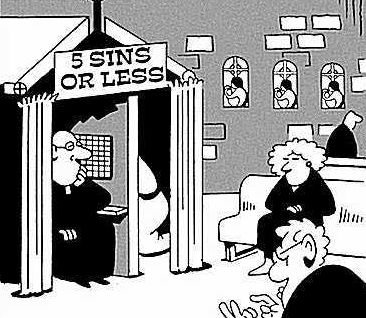But beyond pithy, glib remarks about how much you hate boring old church, there are parts people like more than others; maybe it's the music, maybe it's the excellent sermon, maybe it's the fellowship, maybe it's the comforting liturgy that fits like a very familiar sweater, it could be anything. But I think we can all agree that the most important part is the confession and absolution.
Can't we?
Probably not. That's the funny thing about confession and absolution, in which it is extremely important, but very few of us actually think it's too terribly necessary. In fact, if I was to run a service without music, and one without confession and absolution, which do you think would bother people more? I'll give you a hint: music.
If we take seriously the entire point of the scriptures, they talk at great length about forgiveness of sins. It's a central issue, before there were musical instruments, before there was a church, before there was anything that we would recognize as part of worship, there was sin and forgiveness. When people transgressed that first rule, way back in the garden, there was sin. And when God made his promises to them about a redeemer, there was grace.
Given that this is of such central importance, and given that the Christian church has nothing to offer EXCEPT forgiveness, really, why is it downgraded to such a low matter of importance in the life of the everyday Christian? Primarily because nobody really genuinely believes that this applies to them.
I'll elaborate. The law of God, as you know, is good and righteous. It is perfect in every way. But the trouble is in the way that you and I use said law: we use it very selectively. We use that law of God to comb through the activities that other people do, we use it to check out what other folks are up to, and we are typically delighted when they collapse around us. Most of us have a pretty basic knowledge of the Ten Commandments, and what is located therein. We have a passing familiarity with the rules and laws that God has set up for us, and we are pleased with them because they point out the failings of others. And this is what we're generally all about. We are perfectly able to read through the scriptures, to check out the various laws of God, and to find in them where people have failed God.
And that's what we Christians absolutely love to do. This is precisely why Christians have a reputation as being judgmental instead of humble, of being proud instead of meek, and of generally being pills about a lot of stuff - the trouble is we know the law of God really well, we know the ten commandments, we know the statutes that God has in mind for his people, but we generally just see how that looks in other people.
The readings from this last Sunday were pretty appropriate for this, most especially the one from 2 Samuel concerning Nathan and David. You see, David had in mind to wed and to bed Bathsheba, whom he saw bathing on the rooftop. But Bathsheba was already married to Uriah the Hittite, meaning that she was off limits. But David was the king! He could do whatever he wanted! He could be in charge of everything! And most importantly, he had no earthly power telling him what he could and couldn't do. So he went to the max, and had Uriah killed. He had him put on the front lines of his army, with the full and complete desire to have him become arrow fodder. Which he did. And when Bathsheba was done with her period of mourning, David took her as his wife.
Wow, class act, David. Well played.
But hold on just a second. What I just did with David is exactly what the problem is - we read through the Bible and look for stuff other people are doing. And this is no exception! There's David, being a murderer, and adulterer, a terrible reprobate, and living high on the hog because of it. He is free to wallow in his own crapulence, and nobody is possibly ever going to catch up with him on it, because he's the King. And it's good to be the king.
And it was into this situation that the prophet Nathan entered, to show David his sin. But you and I both know how well that would go. How well does anyone react when you point out their failings? How well do you react when someone points out your failings? When someone shows up to you and says 'you know, you probably shouldn't have been such a jerk,' your reaction is rarely to say 'oh, wow, you're right.' Whether it's a total stranger, or your spouse, or anything in between, if someone points ou t to you that you're a mess, you probably react poorly. And that stands to reason. Nobody wants to hear about how they're a disaster, or a scumbag. You want to go to a church and be told that you're right, that you have the truth, that you're in good shape, and that the reason that the world isn't working the way it should is because other people are doing things wrong.
And knowing that, Nathan, God's prophet, did something very clever. He told David a hypothetical situation involving people who didn't really exist, but who were standing in for people who did. He told the story of a rich man who stole a poor man's sheep, and had it killed so that the rich man, who already had an abundance, could have more. And at this, David's anger burned hot, and he said that the rich man deserves to die, and he must pay back everything he owes to the poor man in spades. And it is then that Nathan says 'You are the man!' And no, not in the way that we throw around these days, but in the way that says 'this story is about you.' And all of a sudden, David, King David, King David who had been in charge of so much, who had been responsible for such a great kingdom, who was untouchable in the extreme, that David had to be humble. He had humility pressed onto him by the story Nathan told, because Nathan had gotten to the heart of what David was all about - able to see sin in others, but not in himself.
You see, God is smart enough to know that this is how we saunter through life, and he's smart enough to know that we are unlikely to just sit there and listen if he berates us for our bad behavior. And so when you hear the teachings of Jesus, they're typically in parables. Why? So that you'll listen. The idea is that you listen to the teachings of Jesus, understand that they're good and righteous on their own, and then see how they apply to you. That's the real trick. That's how God's word works, though, is that it points out to you your flaws, and offers you forgiveness. And as usual, if you read through the scriptures and find only where everyone else has to improve, then you've missed the point, and you need to start over. Why am I so keen on pointing this out? Because unless you get this rather mundane point, then the religion has actually nothing to offer you. Christianity is about justification, and if you think you don't really need any, then the faith is empty for you.
The Gospel reading is great for this. The reading is that of a woman and of a Pharisee, and the woman is a sinner. And the idea that the Pharisee has is that Jesus should be pushing her away when she washes his feet with her tears and wiped them with her hair, because she's a bit of a scumbag. And if Jesus was a prophet, then he'd know that she was a mess, that she was a sinner, and that she deserved nothing.
And so Jesus teaches him with a parable, talking about, what else, the forgiveness of sins. He mentions that this woman is grateful because she has been forgiven much. She has been forgiven of a great many sins, and those sins, which had been weighing heavily on her, have been lifted. And what a great and wonderful feeling it must have been, because she was certainly aware of what she had done. She was certainly aware of her own condition, she was certainly aware of her own failings, of her own problems and difficulties, and when Jesus promised to take care of that, she could not have been happier. The only reason that the Pharisee was not there right along with her was because he really understood his own sin as not that big a deal.
He who is forgiven little loves little. And that's where we Christians are. Not that God won't forgive more sins, and not that he won't forgive all your sins, but he won't forgive what you retain. If you come to God only with something minor, as Christians tend to do; if you come to God with the following list of sins:
coveting sometimes
saying 'damn'
skipping church one Sunday
not eating fish on Fridays.
If that's your list of sins that you have, then you will love little, because God has nothing to offer you. All he has to offer you is holiness and righteousness through the forgiveness of sins, and if you bring him nothing for him to forgive, then why do you care about any of this?
 But Luther was onto something when he told us to sin boldly. Don't hide your sin from God, don't pretend you don't have any. Don't be like the Pharisee at that dinner party and smugly assume that you're okay because you're not as bad as the next lady. Sin boldly, so that the grace of God may be apparent in you. Bring God your actual sins, not just a list of safe sins that it's okay to commit, because what's the point? Bring him your lust, your desires, your greed, your pride, your gluttony, your sloth, your shortness with your friends and family, your dreadful bigotry. Bring him all of that and be forgiven of that. Can you imagine how much more you'd love God if he actually forgave your real sins? Can you imagine how much closer your relationship with him would be if you let him do what he's here on earth to do, to forgive sins?
But Luther was onto something when he told us to sin boldly. Don't hide your sin from God, don't pretend you don't have any. Don't be like the Pharisee at that dinner party and smugly assume that you're okay because you're not as bad as the next lady. Sin boldly, so that the grace of God may be apparent in you. Bring God your actual sins, not just a list of safe sins that it's okay to commit, because what's the point? Bring him your lust, your desires, your greed, your pride, your gluttony, your sloth, your shortness with your friends and family, your dreadful bigotry. Bring him all of that and be forgiven of that. Can you imagine how much more you'd love God if he actually forgave your real sins? Can you imagine how much closer your relationship with him would be if you let him do what he's here on earth to do, to forgive sins? We are justified by faith in Christ. Our sins are forgiven, we are redeemed, we are given grace beyond all measure. The only thing is, what do you do with it? Do you love little because you are forgiven little, or love much because you are forgiven much . Jesus promises to forgive pretty much everything, it's just a matter of what do you turn over to him? This was the question that many of us had in Catholic school growing up, which was, when it was time for confession of sins, we all asked 'what if you don't have any sins to confess?' It seems funny now, but we all earnestly thought that was going to be a problem - that we'd get to the confessional, and have nothing to say. But sin boldly. Sin boldly, and know your sin - not the 'I haven't read my Bible enough' or 'I don't pray as often as I should,' but 'I love internet pornography' or 'I can't stand my inlaws.' If you take stock of your sin, for real, you'll realize how big it is. And when you realize that Jesus promises to take away all those sins, you probably won't be able to stop kissing his feet and wiping his feet with your hair. But if you, as a typical Christian, only give to him small sins for him to forgive, acceptable sins, then you will love him little.
We are justified by faith in Christ. Our sins are forgiven, we are redeemed, we are given grace beyond all measure. The only thing is, what do you do with it? Do you love little because you are forgiven little, or love much because you are forgiven much . Jesus promises to forgive pretty much everything, it's just a matter of what do you turn over to him? This was the question that many of us had in Catholic school growing up, which was, when it was time for confession of sins, we all asked 'what if you don't have any sins to confess?' It seems funny now, but we all earnestly thought that was going to be a problem - that we'd get to the confessional, and have nothing to say. But sin boldly. Sin boldly, and know your sin - not the 'I haven't read my Bible enough' or 'I don't pray as often as I should,' but 'I love internet pornography' or 'I can't stand my inlaws.' If you take stock of your sin, for real, you'll realize how big it is. And when you realize that Jesus promises to take away all those sins, you probably won't be able to stop kissing his feet and wiping his feet with your hair. But if you, as a typical Christian, only give to him small sins for him to forgive, acceptable sins, then you will love him little.But remember this - He promises to forgive everything. The only thing preventing your forgiveness is you. Sin boldly. Give him your sins, and be absolved.
PJ.






